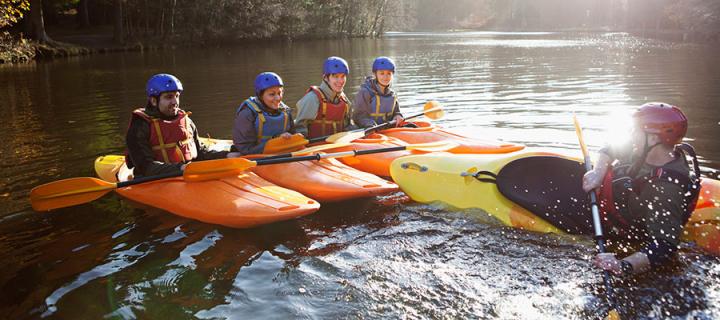Enhancing professional judgement and decision-making expertise in hyperdynamic environments
Research in sport and performance psychology has established new evidence that has had a demonstrable impact on enhancing professional judgement and decision making (PJDM) expertise in hyperdynamic environments, both inside and outside sport.

Research hub
Research expert(s)
Research centre/group
Human Performance Science Research Group
What was the problem?
Hyperdynamic environments are characterised by time-pressured decision making, uncertainty, ill-defined and competing goals, high stakes, and stressful field conditions. It is especially important to understand decision making in these complex, hyperdynamic environments to inform and enhance how professionals form judgements and make decisions about their practice.
The researchers identified potential partners who could benefit from enhanced understanding of decision-making in hyperdynamic environments, including: sports coaches, crime scene examiners and organ retrieval teams.
What did we do?
Introducing professional judgement and decision making (PJDM) to applied sport psychology and sports coaching
Collins and Martindale were among the first to promote the need to explore how applied sport psychologists and sports coaches form judgements and make decisions about their practice. Their body of work (published from 2005 onwards) coined the term “professional judgement and decision making” (PJDM) and promoted the concept as a way of advancing training, evaluation, and practice for professionals.

Collins, Martindale and colleagues’ 2014 paper challenged the prevalent competency-based training models used in sports science, medicine, and coaching, which focus on observable behaviours to assess practitioners’ development. Their 2018 paper further highlighted the role of PJDM in underpinning an expertise-based approach for “raising our game” in training applied sport psychologists. Both papers argued that an expertise-based approach, focused on developing adaptive thinking and professional judgement, would better prepare practitioners. They promoted complex decision making and proactive experimentation as essential for providing consistently optimal support in the dynamic and uncertain contexts of sport.
Martindale’s collaborative research published in 2019 explored UK trainee sport and exercise psychologists’ perspectives on developing PJDM expertise. A longitudinal, qualitative data set was established by tracking 7 trainees over a 3-year training period. Participants reported that the use of experience, analytical reasoning, and observation of other practitioners were useful for accelerating the development of PJDM expertise. The paper re-iterated an earlier call made by Collins and Martindale to use knowledge elicitation techniques such as applied cognitive task analysis (ACTA) to capture and disseminate the knowledge used during experts’ decision making.
Collins’ recent collaborative research published in 2020 enabled the development of adventure sport coaches’ PJDM using a structured approach to critical reflection termed the “Big 5” (B5). After training on the B5, 38 Senior Instructors used the approach for a 12-month period as an experiential method of enhancing PJDM. Following the intervention, interviews were conducted with 4 Heads of Centre and 5 Learning and Adventure Managers who reported that the adventure sport coaching professionals at their centres found the B5 approach to be positive and adaptable to underpin their work in these hyperdynamic, high-stakes environments.
Applying PJDM research to hyperdynamic environments outside sport

Subsequent research applied PJDM research to hyperdynamic environments outside sport. For example, in 2013 the Scottish Police Authority Forensic Services approached Martindale and Collins to identify the cognitive demands on PJDM in crime scene examiners for the first time. Funded by a University of Edinburgh College Knowledge Exchange grant and the Scottish Institute for Policing Research (SIPR), the research used ACTA methods to access the knowledge and PJDM of 6 of Scotland’s most senior scene examiners. The methods which helped to identify the cues and strategies needed to effectively perform forensic recovery, included retrospective recall and simulations of crime scenes. The researchers used these data to develop a scenario-based training tool for crime scene examination response to major incidents and licensed it to SPA FS. The 2017-published study illuminated how experienced professionals make judgements and decisions at crime scenes.
Martindale and colleagues’ further research identified the cognitive demands on PJDM in transplant surgeons and scrub nurse practitioners, and used a simulation study to assess organ retrieval team performance. Consequently, in 2016 the UK National Organ Retrieval Service (NORS) commissioned Martindale, Richards and PhD student Gala Morozova to undertake evaluative research to determine how a proposed change to their service delivery model would affect team performance.
The ‘Vanguard Study’ published in 2020 evaluated the performance of 56 abdominal and 54 cardiothoracic teams attending UK multiorgan retrievals. This first large scale study examining human performance during organ retrieval in the world used data from psychometric scales, qualitative comments, and quantitative outcome measures. Findings identified significant negative impacts of the new model on team performance, which informed the UK NORS decision to reject the proposed change.
What happened next?
Impact inside the world of sport
The PJDM research has been applied and had impact to advance sports coaching policy and practice to develop more than 3,000 practitioners’ judgement and decision making, who in turn provide courses to more than 25,000 individuals across the UK each year. Examples include work with the UK Strength and Conditioning Association to incorporate the PJDM approach into its multi-tier accreditation process for members, work with the UK’s national outdoor centre Plas y Brenin in Wales to enhance the training for its sports practitioners, and work with the Outward Bound Trust to apply PJDM approaches.
The strong evidence base… enables us to move beyond the simple competency frameworks which have dominated work in British coaching. …[The PJDM research] also offers very practical and face-valid methods through which these aspects can be operationalised, taught and evaluated.
Impact outside the world of sport
The research has also had significant impact outside of the world of sport supported by ESRC Impact Acceleration Account grants. For example, the Scottish Police Authority Forensic Services embedded PJDM in its standard operating procedures and internal training programmes to enhance professional judgement among 120 crime scene examiners who make vital decisions at approximately 25,000 crime scenes across Scotland each year.
We have been able to harmonise our initial approach to complex and major incidents which has strengthened and simplified team-working dynamics, and improved effective deployment of resources from different areas [and] has standardised our contribution to the Police investigation, [as] evidenced by positive feedback from our Criminal Justice partners.

Furthermore, the researchers’ Vanguard Study has increased the understanding and awareness of how proposed changes to the UK National Organ Retrieval Service’s (NORS) delivery model would affect staff from a performance psychology perspective. The health implications are significant given that effective retrieval is essential for these organs to be preserved and viable for transplantation. More than 5,000 organs are retrieved for transplant in the UK each year, which saves lives and improves people’s quality of life.
The Vanguard Study… developed an entirely new evidence base which allowed clear decisions to be made about implementation. …This study was a landmark in establishing the role of performance research in shaping retrieval practice.

